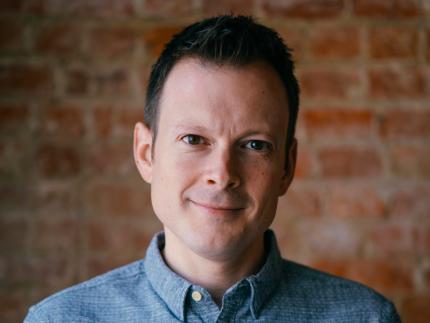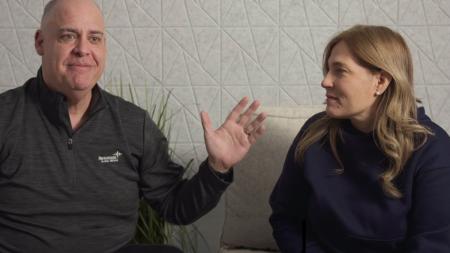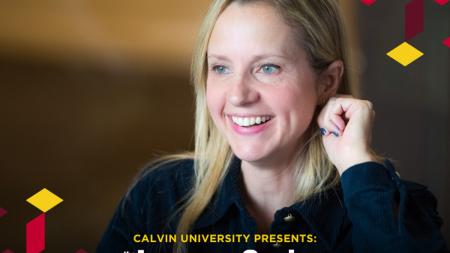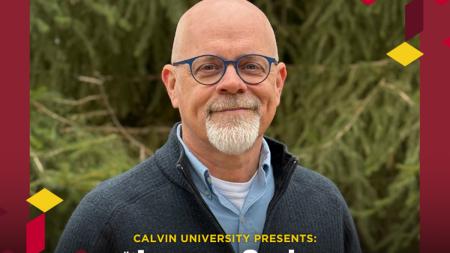Food as a Message of Hope

Having overseen the distribution of food for several years in the wake of disasters around the world, Nate Mook quickly put his skills and connections to work after Russia invaded Ukraine last February, he said during his presentation at the January Series 2023.
In his talk, titled “The Urgent Pursuit to Nourish the World,” Mook said that “as the bombs began to fall in the first days of the war, we were able to assess the situation from the Poland border, and it was chaos. Hundreds of thousands of people began streaming across the border into Poland and other countries.”
At the time, Mook was CEO of the aid group World Central Kitchen, which has provided millions of meals to people in the wake of disasters – including the COVID-19 epidemic – across the globe.
Showing a series of slides, Mook said that after the war broke out in Ukraine, he and volunteers from World Central Kitchen initially delivered hot meals in below-zero weather to people in long lines waiting to leave Ukraine and hoping to find refuge in Poland.
“We walked for miles and served families as they waited in their cars. Many of them were freezing and welcomed a meal,” said Mook. “It was gratifying to see the joy on the faces of children as we gave them some chocolate.”
The January Series is a free 15-day lecture series that takes place each year at Calvin University and, says promotional material, “aims to cultivate deep thought and conversations about important issues of the day in order to inspire cultural renewal and make us better global citizens in God's world.”
Running weekdays at 12:30-1:30 p.m. (EST) through Jan. 27, the January Series takes place in Calvin’s Covenant Fine Arts Center. Online viewing is also available; simply register to watch.
Mook said World Central Kitchen also set up feeding programs during the wildfires in California. It distributed food following a hurricane in Puerto Rico; it was there after the eruption of a volcano in Venezuela; and it partnered with restaurants across the U.S. to provide food during the COVID-19 pandemic.
World Central Kitchen was founded by celebrity chef José Andrés after a massive earthquake killed hundreds of people in Haiti in 2010. Mook joined the organization after Hurricane Maria ravaged Puerto Rico in 2017.
“What we found in Puerto Rico was catastrophic. The country was on the brink of a humanitarian crisis,” said Mook. “In the end, we were able to provide more than 2 million meals.”
World Central Kitchen has also served meals to thousands of refugees at the U.S. and Mexico border in McClellan, Tex. At the start of the COVID-19 pandemic, said Mook, they were called to serve meals to the hundreds of passengers quarantined on a cruise ship that couldn’t dock in Japan.
“Distributing food is apolitical by nature and allows World Central Kitchen to work in many countries. After all, everyone has to eat,” said Mook.
Since the beginning of the war in Ukraine, said Mook, World Central Kitchen, with the help of thousands of volunteers, has been able to distribute hot meals and various grocery items to millions of people in Ukraine and in countries to which Ukrainians – mostly women and children – have fled.
“It is very simple and yet quite profound to get fresh food out in times of trouble,” said Mook, who has also worked as a documentary filmmaker. “We talk to people and listen to their stories. This is not about throwing aid at people but standing side by side with them during times of crisis.”
Until recently Mook served as CEO of World Central Kitchen. He is now president of the Ukraine Foundation, which has an emphasis on feeding people, especially school children, but also looks at what must be done in helping to rebuild Ukraine right now in liberated cities and after the war.
“Life must go on; schools and universities need to reopen; businesses must start to function again,” said Mook.
As he continues to work in his new role with the Ukraine Foundation, Mook has launched a program to feed abandoned pets that families had to leave behind when they fled Ukraine.
“These animals have wandered the streets. People have also taken many pets in. We met one woman who was looking after 35 cats.”
So far, the animal feeding program has been a success.
In one photo taken by Mook, dogs in an evenly spaced line wait to receive food in the city of Kramatorsk. The Ukraine Foundation also distributes food to animals at feeding stations across Ukraine.
“Food needs are huge in liberated areas,” but “evacuating pets from the frontline” is also necessary, wrote Mook in a Facebook post. “Volunteers are risking their lives rescuing cats and dogs.
At the January Series, he said: “So we are taking care of the animals. We have set up a system to get food out to them. Pets are so important to people. We have seen the great humanity of the Ukrainian people as they work with us,” said Mook.
Crisscrossing Ukraine, Mook said, he has seen a great deal of devastation – burned-out vehicles, piles of rubble that used to be homes, bombs that fell but didn’t explode, and schools with shattered windows and extensive smoke damage.
Yet, in the midst of the ongoing war, they have begun setting up regional kitchens in many towns such as Bucha, which Ukrainian forces took back from the Russians and in which many people were found to have been tortured and killed and dumped into mass graves.
“It is critical that cities and towns get back up on their feet as they are freed from the Russians. It won’t be easy for them, but we want to help in any way we can,” Mook said. “Our approach is always the same. A plate of food is more than just calories. It is also a message of hope.”


